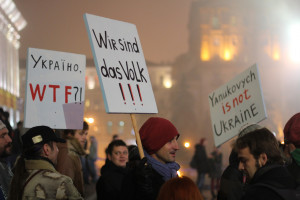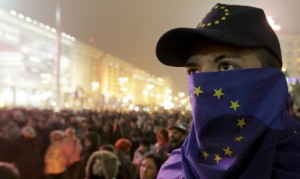
The third Eastern Partnership summit was for months touted to be a highly-historic event. This was based on the assumption that Ukraine, the second largest of the six Eastern Partnership countries after Russia, would continue to strengthen relations with the EU by signing the Association Agreement, a framework which would bring Ukraine into the EU’s free trade zone as part of a preliminary step towards possible EU membership, among other perceived benefits. The Ukrainian leadership’s apparent U-turn just less than two weeks prior to summit shocked EU leaders and was largely viewed as the result of lobbying from Moscow and economic realities. This can be explained in part by the Kiev’s acceptance that any drift towards the EU would come at a price, especially in terms of bilateral trade with Russia.
It came as no surprise that thousands of pro-EU Ukrainians have hit the streets of Kiev and other cities in recent days, with some even calling for snap presidential and parliamentary elections. As protesters vent their emotions, the disappointment in their country’s leadership has the potential, at least partially, to spill over into outright disillusionment with the EU, providing a greater opening for Russia.
A pivotal point for Ukraine
The EU’s current setback in Ukraine comes as Moscow is working to expand its Eurasian Customs Union, an economic alliance, which already unites Russia with Belarus and Kazakhstan and is expected to include other former Soviet states in the coming years as well. Against this tense backdrop, Ukraine is being presented in the Western media as a key battleground between Brussels and Moscow, both vying for influence in their backyards and one of the former Soviet Union’s most strategic republics.
Russian and EU officials have made it clear to Kiev that membership in one bloc is incompatible with the other, and that Ukraine could not continue its balancing act in straddling between the two indefinitely. In raising the stakes, Moscow aims to establish a Eurasian Union by 2015, based partly on the EU model, with the Eurasian Customs Union serving as a key component.
Ukraine’s decision not to sign the deal was a psychological blow to the few countries that remain within the crosshairs of the Eastern Partnership program. In the others, Belarus, Russia, Armenia and Azerbaijan, the Eastern Partnership program has received either no interest or only negligible success. This was perhaps most evident in Armenia, which, despite making significant progress in EU reforms, decided on Sept 3, 2013 to instead maneuver towards Customs Union membership, largely due to immediate economic considerations. Georgia and Moldova did initial the EU Association Agreements and other documents during the summit as expected, but as the Ukrainian example has demonstrated, initialing the agreement does not mean a definite follow-through with signing.
Georgian and EU integration – Economic considerations
In the lead up to the summit, Moscow did not present the same disincentives to Georgia as it had to Ukraine and Moldova; these included a new customs regime to test border controls in the event of a future signing of the EU Association Agreement. While Georgia’s leadership has pledged to follow through with signing the agreement at the Eastern Partnership’s next summit (scheduled for February or March 2014), a serious reaction from Moscow to Georgia’s policy course ahead of the Vilnius Summit would have been counterproductive. Georgia and Russia have been improving relations in recent months, particularly in the trade sphere, and the Georgian leadership will need to consider how such links could be threatened by moving ahead with more enhanced Georgian-EU trade ties.
Ukraine’s experience in recent months makes it clear to Georgian officials that signing the agreement may produce some benefits, but will also come with real economic and ramifications since a free trade regime with the EU will not be compatible with Russia’s customs regime, including quality control standards. Considering the sluggish state of Georgia’s economy, the country’s leadership will likely not risk taking steps that could lead to even a temporary closure of the much-needed Russian market, which after six years of embargo was only recently reopened to Georgian mineral water, wine and other agricultural products.
Geopolitical realities
Moreover, Georgia’s willingness to improve ties with Russia in spite of Moscow’s recognition of the country’s breakaway regions of South Ossetia and Abkhazia as independence states following the Russian-Georgian War in 2008 creates a strategic impasse that can’t be immediately resolved by closer integration with the EU.
Georgian citizens will likely become increasingly aware of the contradiction of integrating with Western structures while lacking territorial integrity. Although Georgian officials may tout the theoretical long term benefits of an Association Agreement, it would block immediate possibilities for restoring limited cross border trade with the breakaway regions. They will likely also come to understand that signing the EU Association Agreement doesn’t automatically confer many benefits, such as a visa free regime, or complete access to the European market or even eventual EU membership. Meanwhile, shared values between Russia and Georgia and political realities within Georgia will influence the country’s actions at the next Eastern Partnership summit.
Cultural constraints

On a strategic level, the outcome of the event revealed a reinvigorated sense of fraternity among Georgians and their Christian Orthodox northern neighbors. In the days following the clashes, a series of rallies were held in the Georgian capital where participants called on their government to pass legislation similar to Russia’s own laws aiming to counter “the spread of homosexual propaganda”. Although these rallies were small, they helped raise questions about the actual purpose of many foreign NGOs in Georgia which support Georgia’s gay community. The result is that many Georgians who are otherwise uninterested in the affairs of “sexual minorities” have since become skeptical of what it means to adhere to European values as a whole.
With the help of the media, the sensitive issue of homosexuality will likely be reactivated in the weeks leading up to the 2014 Winter Olympics in the southern Russia city of Sochi. Rallies directed against Russian views on promoting homosexuality and counter protests combined with statements by the world’s key religious leaders will help spur more discussion about the topic in Georgia, providing an avenue to impede Georgian society’s interest in the West and the EU integration process as a whole.
Political concerns
Aside from these cultural considerations, there is also a fear that former Georgian President Mikhail Saakashvili could follow in the footsteps of Yulia Tymoshenko, Ukraine’s ill-fated Orange Revolution-era Prime Minister who was imprisoned for abuse of power after losing a run for president to Viktor Yanukovych in 2010. Saakashvili’s imprisonment, as Tymoshenko’s had, would ring “selective justice” in Brussels, and would most certainly hamper EU-Georgian relations, especially within the frames of the Eastern Partnership initiative. Again, as with Tymoshenko, the result would likely be that the EU would make any further integration with Georgia dependent on his release.
In underlining this concern, Poland’s Foreign Minister Radoslaw Sikorski told journalists on the sidelines of the Vilnius Summit that EU leaders’ message to Georgia is that the Georgian government has had its “Caucasian vendetta with the previous administration, but enough is enough.” However, this statement’s real intent may have more to do with Poland’s geopolitical interest, and less to do with the justice process in Georgia. The current Georgian authorities will likely continue to accommodate a segment of society that is keen on seeing Saakashvili join other former officials behind bars for various abuses of power and real crimes.
Moving forward
It remains unclear just how the EU will further proceed with its Eastern Partnership initiative, but among the participating member states, the uncertainty of the policy course based on Ukraine’s example, combined with increased internal skepticism of EU effectiveness in the face of Russia’s resurgence, will likely contribute to a growing trend of setbacks and diminishing expectations.
The standoff over Ukraine further demonstrated that Russia is willing to go to great lengths in discouraging its neighbors from moving any further towards the EU. The unsatisfactory outcome of the Vilnius Summit not only buys time for Moscow to expand its Customs Union; it also frees up energy and resources for Russia to devote to improving its relations with Georgia. As Russian President Vladimir Putin announced during a visit to the Armenian capital Yerevan on December 2, Russia intends to “strengthen its positions in the South Caucasus”.
Ian Carver, communications specialist and freelance journalist, that has worked extensively in the Caucasus, the Middle East and Central Asia, exclusively for the online magazine “New Eastern Outlook”.
